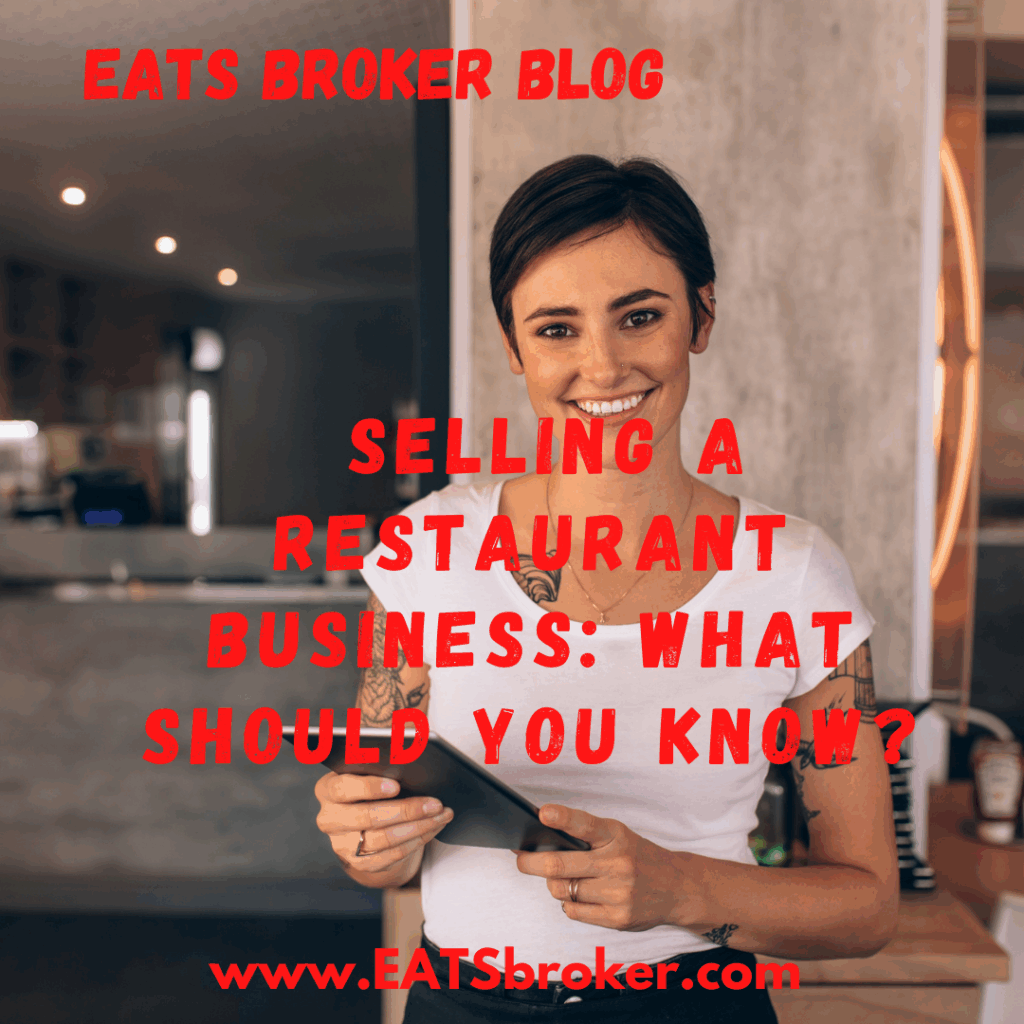Selling a restaurant business includes valuations, fees, and legalities. These are some of the crucial aspects from initial considerations to closing the deal. The starting point for selling a restaurant is to have an accurate restaurant valuation. Restaurant Brokers use two methods: asset-based valuation and Seller Discretionary Earnings (SDE) or EBITDA.
The Restaurant Broker at EATS Broker advises anyone looking to sell a restaurant to get professional assistance. The professional team should include the following advisors:
–Restaurant Brokerage firm
-Accountants/CPA
-Attorney
-Escrow Company
Selling a restaurant is a “team sport” requiring an attorney, an accountant, and your restaurant broker. The restaurant seller’s professional team will help navigate complex financial, legal, and operational considerations, including sales tax implications and the often-challenging process of lease transfers.
Dallas Restaurant Broker Dominique Maddox says, “We help our clients identify and qualify buyers and provide discretion and confidentiality throughout the sale process. When selling a restaurant, essential financial and legal preparations are crucial for a smooth and successful transaction”.
When it’s time to sell a restaurant, what should you have?
1. Gather Essential Documents: accurate financial reports from the last three years
-Tax Returns
-Profit and Loss
-POS Sales Reports
-Sales Tax Filings
-Credit Card Statements
-Franchise Sales reports for franchise restaurants
-Balance Sheets
The buyer wants to have a clear picture of the restaurant’s financial health, which includes revenue, costs, profits, liabilities, and consistent cash flow. Restaurant owners should ensure all tax returns are up to date and accurate.
An essential part of selling a restaurant is valuing it and preparing the Restaurant Story for the buyers. Several methods are used to estimate a restaurant’s value.
Seller’s Discretionary Earnings (SDE): This method calculates the total financial benefit a future owner will receive. It starts with net income and adds back non-operating or discretionary expenses (like owner’s salary, one-time costs, taxes, depreciation, amortization) to determine the cash flow available to the new owner. Your business’s value is often a multiple of its SDE. For example, if SDE is $400,000/year, a multiplier of 3x could result in a $1.2 million listing price.
EBITDA (Earnings Before Interest, Taxes, Depreciation, and Amortization): This is typically used for larger restaurants or those with professional management where the owner is not involved in daily operations. It provides a clear view of profitability by excluding certain expenses.
Asset-Based Valuation: For restaurants that haven’t been consistently profitable, the value of physical assets (equipment, furniture, leasehold improvements) might be the primary determinant of value. These hard assets are valuable because they offer a turnkey location for a new operator, saving time and money compared to building from scratch.
**Experienced restaurant brokers will use bank lending guidelines and requirements when conducting a restaurant valuation. Most banks want to see a 1.25-1.5 debt service coverage ratio.**
3. Understand Business Structure and Ownership Transfer:
Asset Purchase vs. Stock Purchase: In most restaurant sales, the business is acquired through an asset purchase agreement, meaning the buyer receives the seller’s assets. Less commonly, buyers may obtain the seller’s corporation through a stock purchase agreement, which means the purchaser takes on all the entity’s liabilities (“warts and all”). Your CPA and attorney are critical for explaining the pros and cons of each.
Defining Assets: Clearly define which assets are being transferred, ranging from tangible items like kitchen equipment and furniture to intangible assets like the restaurant’s brand name and customer goodwill. Decide upfront whether you are selling the name, concept, and recipes, or if the buyer is expected to bring their own.
4. Inventory: Most asset sales and stock purchases exclude inventory from the purchase price. However, inventory purchased for resale is usually tax-free.
5. Franchise Disclosure Document (FDD)
If your restaurant is a franchise, the franchise agreement dictates specific requirements for the transfer of a restaurant. These can include the franchisor’s right of first refusal, approval of the buyer, and transfer fees. The buyer may also need to complete franchisor training or meet specific qualifications (e.g., net worth, proof of funds
6. Finalizing the Asset Purchase Agreement: Once negotiations are complete, your attorney or restaurant broker will draft a comprehensive sales agreement outlining all terms, including purchase price, included assets, and contingencies. Please review it carefully with your attorney or restaurant broker to ensure it reflects negotiated terms and protects you from potential liabilities.
By diligently preparing these financial and legal aspects, you can navigate the complexities of selling your restaurant and work towards a successful transaction.
7. Prepare for Due Diligence:
Comprehensive Review: Buyers will conduct a thorough due diligence, reviewing financial records (P&L, tax returns), contracts (leases, vendor agreements), licenses, permits, and employee records. They may also physically inspect the premises and equipment.
Organized and Accurate Information: Have all documents organized, up-to-date, and readily available. Providing accurate and complete information is essential for maintaining trust and avoiding legal issues. Your attorney will confirm that assets are free and clear of any liens.
Lease—Buyers will review the current lease and contact the landlord to start the lease assignment. The landlord might require the buyer to sign a new lease and try to increase the lease rates.
Buyer Package: Prepare a strong buyer package for the landlord, including a complete application, personal financial statement, consent to credit check, business plan, and tax returns. Ensure all forms are typed, complete, and supported by documentation.
For more information on the restaurant market and other available consulting services or a complimentary restaurant valuation, contact Restaurant Business Broker Dominique Maddox at 404-993-4448 or email at [email protected]. Visit our website at www.EATSbroker.com

